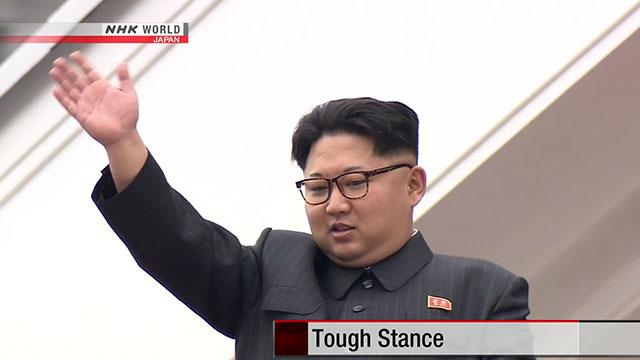"We have confirmed and analyzed more facts about North Korea's ballistic missile launches. We have held discussions about the best course of action and agreed to make our utmost efforts to secure public safety. We also agreed to gather information and continue monitoring to prepare for any further provocative acts by the North," Abe said.
The missiles traveled about 1,000 kilometers before landing in the Sea of Japan. The Japanese government says 3 landed within its exclusive economic zone.
South Korean military sources say the missiles were fired from the Tongchang-ri region near the border with China.
Last month, North Korea fired a ballistic missile from a launch site in the same province. That missile also fell into the Sea of Japan after flying about 500 kilometers.
NHK World correspondent Hiroki Yajima joins anchor Minori Takao in the studio.
Takao: World leaders are very critical of the regime. Malaysia is trying to expel the country's ambassador over the killing of Kim Jong Nam. Why more provocation from the North?
Yajima: I believe that North Korea's provocative actions are a reflection of leader Kim Jong Un's fear of plots against his regime. His half-brother, Kim Jong Nam, could have posed a threat, being at the center of North Korean defectors. And this missile launch would help cement Kim Jong Un's powerbase and boost his prestige. He is still in his early 30s, so he probably feels like these actions give him a tougher image. The launch could urge US President Donald Trump's administration to take some action. Pyongyang is building tension on purpose, possibly to spark talks with the US. Kim Jong Un may want to negotiate with the US as a nuclear-state.
Takao: Tell us about the timing of the launches. Why now?
Yajima: Well the drill between the US and South Korea is another factor. Right after the drill began, the country again vowed tough measures. These are annual exercises, and during last year's exercises Pyongyang took similar actions, launching ballistic missiles. But this time, the Japanese government says 3 have fallen in waters inside Japan's Exclusive Economic Zone. And as we've been hearing, Tokyo reacted strongly. So I suppose that these strong measures show North Korea's sentiment that the North is threatened by the exercise and being pressured by the international community.
NHK World's Mitsuko Nishikawa joins anchor Minori Takao in the studio from Beijing.
Takao: Pyongyang chose to fire its missiles just as its top ally held one of the biggest events of its political calendar. Leaders from across China are in Beijing for the National People's Congress, where they were hoping to focus on their slowing economy. Mitsuko, how is Beijing reacting to the missile launch?
Nishikawa: There's no official reaction yet. The leaders are immersed in the biggest event of their political calendar, so they won't be happy with the timing. Even people we spoke with on the street said it seemed like Pyongyang was making light of China.
Relations between the 2 countries have been cooling fast. Beijing voted for stronger UN Security Council sanctions. And they've suspended imports of coal for the rest of this year. That's a major blow to Pyongyang's wallet. And just last week, Foreign Minister Wang Yi turned up the pressure in person, telling a North Korean Vice Foreign Minister his government should exercise more self-restraint.
But it all seems to be falling on deaf ears so far. We're expecting the official reaction from China's Foreign Ministry at a news conference later today.
Takao: All right, speaking of the National People's Congress, the leaders have lowered their growth target. What are they planning to do about their slowing economy?
Nishikawa: One big problem is the number of near-bankrupt state-owned enterprises. Professor Yao Yang, who advises Premier Li Keqiang, told us these SOEs are high on the government's agenda.
"Many of them are borrowing new money to pay for older debts. Now this time, the government has set the new policies, specific policies to deal with excessive debts to deal with SOE sector."
-Yao Yang / Professor, Peking University
Nishikawa:Professor Yao says the government has been trying to reform the sector for two decades but with only limited success. He says structural reform is essential for long term growth, and the premier echoed that view in his speech.
"We will tackle the problem of 'zombie enterprises.' We'll encourage mergers and restructuring, wipe out bankruptcies, and shut down all outdated factories."
-Li Keqiang / Chinese Premier
Takao: What else did Li talk about?
Nishikawa: He laid out quite a wide range of ideas. He said he will make skies blue again. The skies are blue here today but air pollution is a big issue for people. The government is focusing more right now on the everyday problems people complain about. He's prioritizing economic and social stability over fast-track development. That's one reason he announced yesterday the growth target was being cut to around 6.5 percent but Professor Yao warns that could backfire.
"I'm a little bit disappointed because it seems pessimistic signal to the market. People would say 'oh, the government is going to tolerate slower growth rate, and they are not going to promote growth again.' And people would take that signal and start to behave according to that signal. That's not good."
-Yao Yang / Professor, Peking University
Nishikawa:Yao says the government needs to show it's determined to pump up the economy. China's Communist Party is heading into a sensitive political season. It will hold its twice-a-decade reshuffle later this year, and with 5 of the top 7 leaders due to retire, the focus is on minimizing disruption both within and outside the country.
